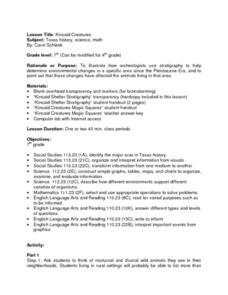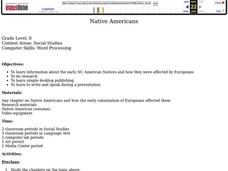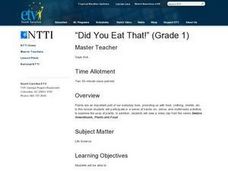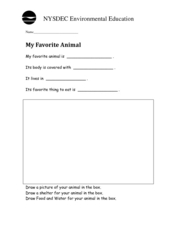Curated OER
Where Do You Fit In?
Students study habitats and then draw a picture of their own habitat which includes the location of food, water, and shelter, and the concept of space. then they cut their habitat in half and discuss how this would affect their lives.
Curated OER
TE Activity: Built to Last?
Fifth graders test the shelters that were built in a prior activity. They determine the level of durability and water resistance of these shelters through a scientific investigation.
Curated OER
The Needs of Living Things
Students watch video clips of animals and plants in their natural environment, to gather evidence that all living things have basic survival needs. Students draw pictures of real or imaginary pets eating, drinking, breathing, and taking...
Curated OER
Kincaid Creatures
Students brainstorm a list of nocturnal and diurnal wild animals they see in their community and discuss how the animals would be different if they were living during the Ice Age. Using a handout, they discover how archeologists record...
Curated OER
Forming A Government
Students simulate being on an island after their ship has wrecked, or their plane has crashed. Food, fresh water, and shelter are in short supply. They must form a government, develop laws and penalties.
Curated OER
Building an African Compound
Students, in small groups create a model of a compound that might be found in a rural African village. As a class, students orally contribute to a summary paragraph on what they have learned about different forms of shelter found in Africa.
Curated OER
Native Americans
Eighth graders are assigned a group of Native Americans from the North Carolina area to study. They research and write a paper, including sections on family, government, food, clothing, shelter, European contact, artifacts and give an...
Curated OER
"The Leaves in October", by Karen Ackerman
Students read a story about a family living in a shelter. They explore different places to save their money and the advantages and disadvantages of each.
Curated OER
Energy for Animals
First graders discover how animals depend on other animals for energy. They identify sources of energy in their daily life and describes the actions of nightime and daytime animals. They list sources of food and shelter for specific...
Curated OER
Security Is...
Students brainstorm examples of how they have heard or seen the word "security" used. Examples might include: security blanket, Social Security, security deposit, or security guards. They create a class list of responses, then create a...
Curated OER
Animal Habitats
Students study the word habitat and its meaning. They also identify that in order for something to be classified as a habitat there needs to be the proper shelter, food, water, and space.
Curated OER
People Of The Plains
Young scholars engage in a lesson that discusses how Native Americans lived in all different parts of North America. They focus on investigating the region's natural resources and how the indians used them to build shelter, make...
Curated OER
No One Should Be Hungry
Young scholars in grade K-3 prepare a meal once a week for 16-20 residents at Welcome House, a homeless shelter in South Kingstown, Rhode Island. This Feinstein Kids Can Make a Difference community service project provides students with...
Curated OER
"Did You Eat That!"
First graders investigate why plants are an important part of our everyday lives, providing us with food, clothing, shelter, etc. In this lesson plan students participate in a series of hands-on, online, and multimedia activities to...
Curated OER
ADULT ESOL LESSON PLAN--Family and Parenting
Students, after reviewing a vocabulary list on the board, examine how to properly take care of children (requirement for food, shelter, hygiene, childcare providers, etc.). In addition, the legal side of taking care of children and their...
Curated OER
NYSDEC Environmental Education
In this Earth environment worksheet, 2nd graders answer 4 questions about their favorite animal. Students must also draw a picture of that animal inside a shelter in the box provided.
Curated OER
Where is Agriculture?
Students study agriculture. In this agriculture lesson, students investigate how agriculture helps to meet a family's needs. Students identify things in their home that began as agriculture.
Curated OER
Two Ways of Life
Students visit Internet sites to compare ways of life of Indians on western Texas frontier and U.S. military men at Texas forts, and draw pictures to illustrate clothing, transportation, weapons, and shelter of both Indians and U.S....
Curated OER
Playground Structure Model
Students, working in groups, design and create a model of a playground shelter, based on specific criteria. Student designs must include research and analysis into weather conditions, safety factors and the cost of the finalized project.
Curated OER
My Wilderness Adventure
Young scholars use a story starter and given questions to continue their adventure. They use the Internet and books to research about winter survival skills, how to find food, water and shelter in the snowy mountains and discover...
Curated OER
Adaptations To the Environment
Students design and construct an imaginary animal that is perfectly adapted to a particular type of biome. They give the animal a scientific name, place it in a phylum and write descriptions about its behavior, reproduction, foraging,...
Curated OER
How Does Climate Affect Your Environment?
Learners access the Global Sun Temperature Project website and research the relationship between the location and climate of a participating school to its building structure. They consider how climate affects the type of structures...
Curated OER
Exploring Habitats
Students analyze the difference between the human habitat and the different habitats of animals in the six lessons of this unit. The students' imaginations and literature are used to explore important aspects of the living environments...
Curated OER
What Are the Needs of Living Things?
In this living things worksheet, students will write down two facts about what a living thing needs to survive. Using these facts, students will draw a conclusion to how those needs are met.
Other popular searches
- Homes and Shelters
- Native American Shelters
- Shelters for Animals
- Bomb Shelters
- Building Shelters
- Homes Shelters
- School Shelters
- Anderson Shelters
- D.t Shelters
- Design Technology: Shelters
- Fallout Shelters
- Cats+ Shelters

























